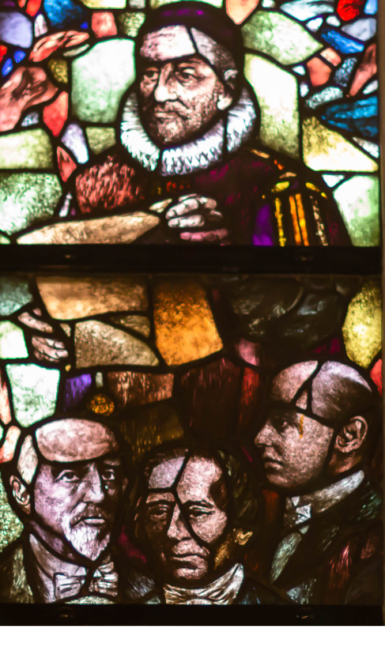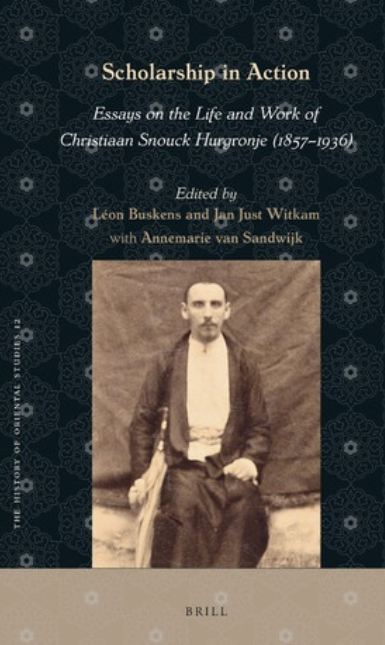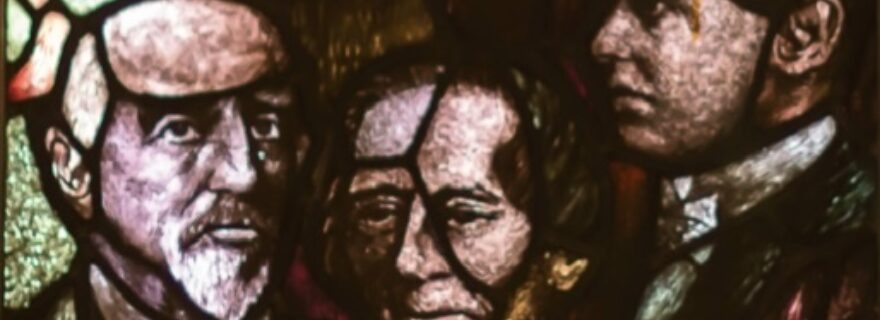Getting Done With Snouck
The 165th birthday of Christiaan Snouck Hurgronje on 8 February, also the dies natalis of Leiden University, is marked by the publication of a new book on his life and work, edited by Léon Buskens, Jan Just Witkam, and Annemarie van Sandwijk. What does it offer?
Since 8 February 1857 the dies natalis of Leiden University has coincided with the birthday of a man who would become one of its foremost scholars and benefactors: Christiaan Snouck Hurgronje. His 165th birthday is marked by the publication of a collection of studies on his life and work, entitled Scholarship in Action: Essays on the Life and Work of Christiaan Snouck Hurgronje (1857–1936).
Snouck Hurgronje was one of the most famous orientalists of his time. After his studies in theology, oriental languages, and Islam in Leiden and Strasbourg, he acquired early fame through his research in Mecca in 1884–85, masterfully narrated in two books and accompanied by two portfolios of photographs. As an adviser to the colonial government in the Dutch East Indies from 1889 until 1906, he was on horseback during campaigns of “pacification” and published extensively on Indonesian cultures and languages. In his participant observation he went as far as marrying twice with Sundanese women, with whom he had several children. He left his family in Java when he became a professor in Leiden in 1906. Together with colleagues abroad he promoted the study of modern Islam, also intended to be useful for colonial purposes. He kept his position of official adviser to the Dutch government in matters of colonial policy and relations with the Muslim world, placing his former students as diplomats in the Dutch consulate in Jedda. At his death in 1937 he left important collections of ethnographic objects, photographs, sound recordings, manuscripts, printed books and archival materials, the fruits of a life full of hard work in a colonial context, to the libraries and museums in Leiden. His Dutch widow and daughter sold the stately mansion on the Rapenburg for a modest sum to the Leiden University Fund, thus transforming it into a lieu de mémoire of Leiden orientalism.

In the 1970s and 1980s Snouck Hurgronje was the object of fierce polemics in the Netherlands, some cherishing him as a hero, others condemning him as a villain embodying the worst of Dutch colonial history. In 2020 the Leiden historian Wim van den Doel published the first scholarly biography. Despite his considerable scholarly, political, and cultural influence in the first decades of the twentieth century, nowadays Snouck Hurgronje has been almost forgotten outside a small circle of specialists, since he published mainly in Dutch and German.
The contributors to Scholarship in Action offer new insights about this enigmatic scholar and political actor who might be considered a classic proponent of “orientalism.” Their detailed studies of his life and work challenge us to reconsider common views of the history of the study of Islam in European academia and encourage a more nuanced “post-orientalist” approach with ample attention for cooperation, exchange, and hybridization.

The first part of the book offers an overview of Snouck Hurgronje’s life and writings, as well as the changing understandings of his achievements. Part 2 contains four essays on his work on Arabia, especially his fieldwork and collecting in Jedda and Mecca. The section on Indonesia contains seven essays scrutinizing how he combined scholarly work with advice to the colonial administration. A substantial article discusses his early sound recordings of music and speech. Part 4 focuses on the period of his return to Leiden, with studies of his research in Istanbul and his relations with Indonesian students in Leiden. Part 5 presents three posthumous appreciations, two older ones by his contemporaries at the centenary of his birth and a recent survey “Orientalist or Master Spy.” The volume concludes with two translations into English with extensive annotations of primary sources concerning Snouck Hurgronje’s research in Arabia: of the “diary” that he kept in Jedda in 1884 and 1885 and of his collection of Meccan proverbs and sayings.
The volume critically reviews the images and representations that contemporaries and later generations created of Snouck Hurgronje, situating these in their social and temporal contexts. In the Dutch polemics of the 1980s several opponents claimed to represent Snouck Hurgronje “as he was”, echoing the positivist ideal of Ranke. Their factual certitude allowed them to pass a moral judgement as well. The present volume leaves ample space for ambivalence and ambiguity, for example concerning Snouck Hurgronje’s conversion to Islam and his research methods. However, we go beyond the bantering attitude of the Leiden old boys who endearingly used to refer to their feared teacher as “Snouck.” Neither a defence or canonization, nor a condemnation are among the authors’ objectives.
Rather than a final judgement, the volume is meant as an invitation for an ongoing exchange and debate. Snouck Hurgronje carefully arranged his archive, thereby trying to orchestrate the images that posterity might construct. The abundance and complexity of the sources leave ample space for further research, also by critically engaging with newly arising questions about “decolonizing knowledge.” We hope that researchers from the areas that Snouck Hurgronje studied, notably the Hijaz, Aceh, Gayo and Java, will take a fresh look at the sources in Leiden and elsewhere. Our initial invitation to scholars from Arabia and Indonesia did not result in actual contributions offering inside views from their societies. Fortunately, in the meantime the scholarly landscape has profoundly changed, also through the cooperation that Leiden University and the Indonesian Ministry of Religious Affairs maintained for several decades in the field of Islamic studies. Indonesian scholars have published important new studies on Snouck Hurgronje and the colonial society that he actively tried to shape. We hope that some of our former students who have now become our colleagues will take our knowledge to the next level by telling their stories about this Leiden scholar who is part of our shared heritage.
On the occasion of the publication of:
Scholarship in Action: Essays on the Life and Work of Christiaan Snouck Hurgronje (1857–1936), edited by Léon Buskens, Jan Just Witkam, and Annemarie van Sandwijk. Leiden and Boston: Brill, 2022.



0 Comments